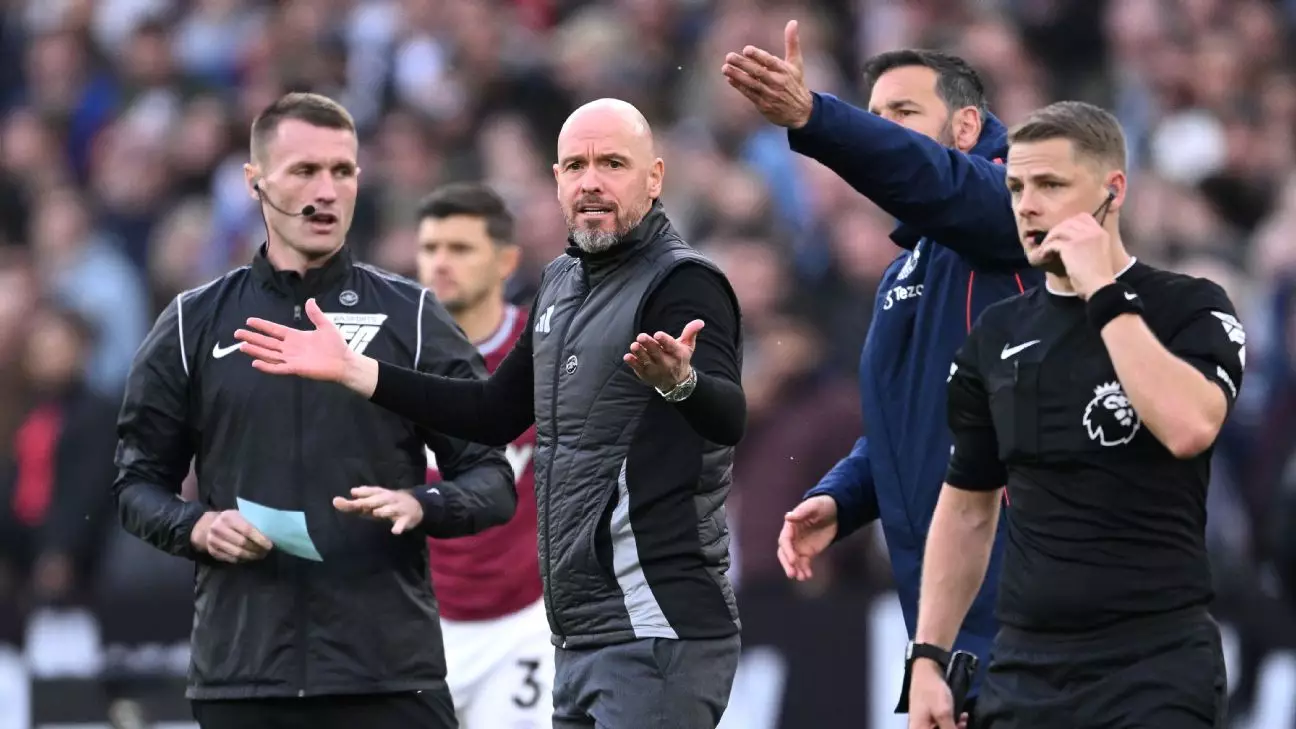The recent Premier League clash between West Ham United and Manchester United serves as a poignant case study in the intense scrutiny and high stakes associated with officiating in professional football. On October 27, a penalty call made by VAR (Video Assistant Referee) ignited a chain reaction that culminated in the dismissal of Manchester United’s manager, Erik ten Hag. The game, which ended with West Ham emerging victorious, not only affected the teams involved but also placed significant pressure on the refereeing body, revealing a series of flaws in how critical decisions are made.
West Ham’s game-winning penalty, awarded in the dying moments of the match, came under immediate scrutiny. Matthijs de Ligt’s encounter with Danny Ings in the penalty box led the on-field referee, David Coote, to initially wave play on. However, his decision was overridden after a VAR intervention, a choice that proved pivotal in more ways than one. Howard Webb, the Premier League’s chief refereeing officer, later critiqued the VAR decision, emphasizing that it failed to meet the necessary standards for intervention. He indicated that the incident was misinterpreted, questioning the reliability of a VAR traditionally seen as meticulous and effective.
Webb’s comments shed light on the complex dynamic between on-field referees and VAR officials. He remarked that the VAR official appeared overly focused on a specific aspect of the play, observing that De Ligt’s leg hit Ings without adequately considering the context of the play. In Webb’s view, this was a nuanced situation where the referee’s original decision should stand. His analysis illustrates a concerning trend within the Premier League where crucial calls could hinge on the subjective interpretation of fairly innocuous incidents.
The ramifications of this penalty were swiftly felt at Manchester United, where ten Hag faced mounting pressure from the club’s disappointing early-season performance. The managerial changes that followed his dismissal are a testament to the broader implications that officiating errors can carry. In the world of elite football, where results can significantly influence careers and legacies, the interplay between sport and officiating cannot be overstated.
The current season has seen a notable decline in the frequency of VAR errors compared to the previous season; however, three major mistakes have been established so far, indicating that the system still has much to improve upon. These incidents, ranging from disallowed goals to missed red card opportunities, paint a picture of a system striving for accuracy yet often faltering under the immense pressure of live play.
The case of Arsenal’s William Saliba is illustrative of the difficulty in VAR calls. Webb defended the VAR’s intervention in this instance, exemplifying the duality of VAR’s role in supporting refereeing decisions while also exposing them to new levels of scrutiny. The inconsistency in decision-making only adds complexity to fans’ and analysts’ understanding of the game. As Webb detailed, there were significant factors that influenced the VAR’s corrective action, demonstrating the thin line between error and fair play that officials navigate on a weekly basis.
A common critique of VAR is that thresholds for intervention are often ambiguous, leading to confusion and frustration among fans and players alike. This ambiguity was further highlighted by the contrasting decisions regarding the Saliba incident and the controversial penalty given in the West Ham versus United match. Webb’s calls for better clarity in these moments suggest that the Premier League acknowledges the need for an ongoing conversation about officiating standards.
Looking ahead, the need for a more structured approach to VAR decisions is clear. One viable solution may involve refining the criteria for what constitutes a “clear and obvious” error. The disparity in how VAR is applied remains a hot topic, not just within the Premier League but throughout global football. Establishing unambiguous guidelines may help mitigate frustrations and bolster the credibility of officiating moving forward.
The events surrounding the recent West Ham versus Manchester United match encapsulate the tumultuous and ever-evolving nature of officiating in the Premier League. As teams adapt to the realities of a VAR-supported game, the pivotal role of referees—both on the pitch and in the VAR room—grows ever more complex. Howard Webb’s reflections signal an acknowledgment of the challenges being faced, and they underline the remarkable influence that accurate officiating wields over the sport’s landscape. Ultimately, achieving a balance that satisfies both the need for fairness and the pace of modern football remains a critical endeavor that lies ahead.

